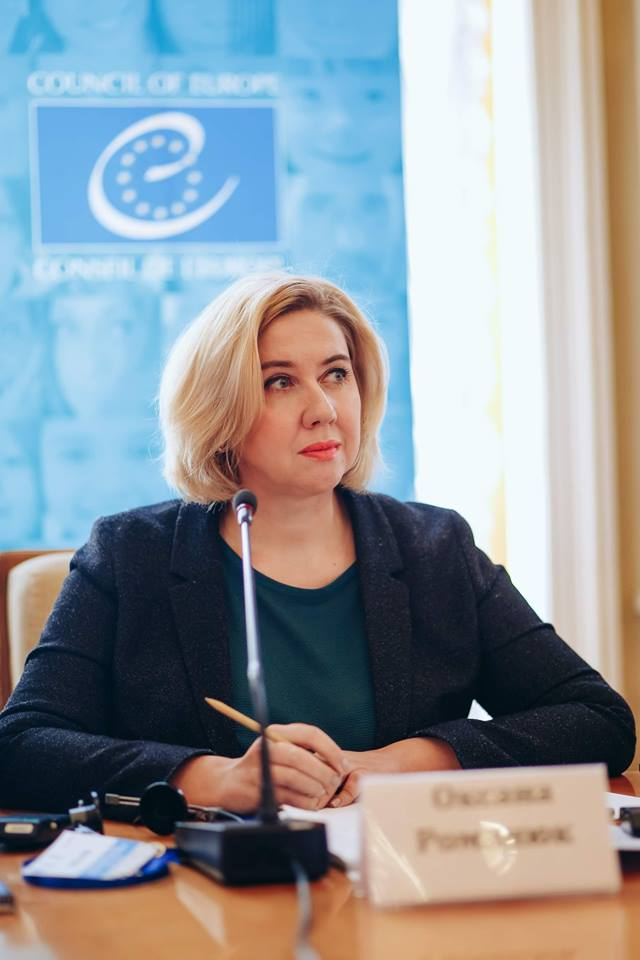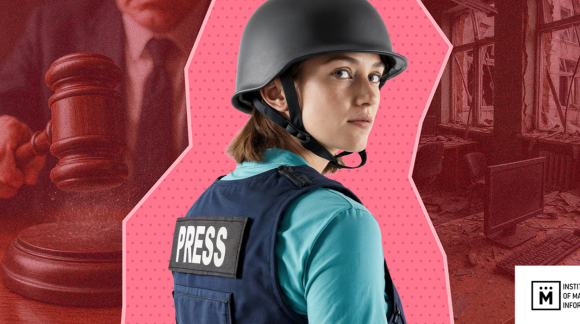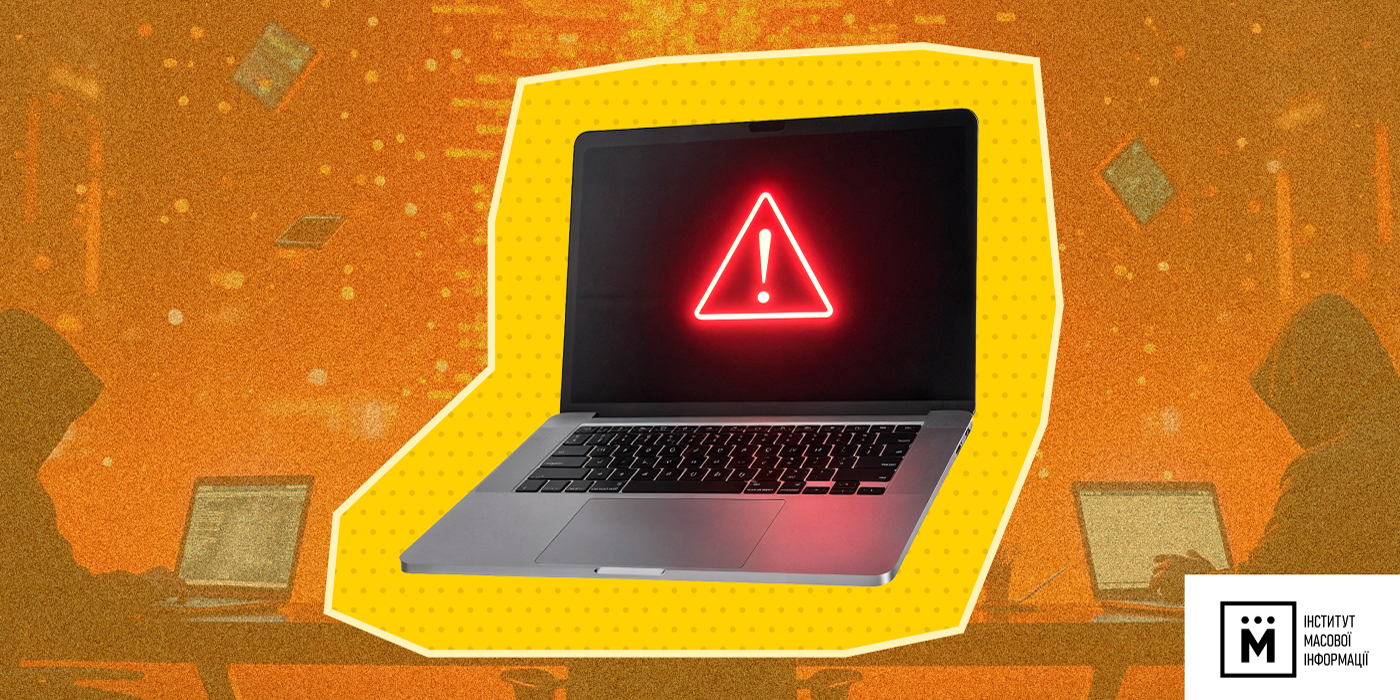
The IMI Executive Oksana Romanyuk defends the idea that by having insulted the journalist, the newly elected MP Maksym Buzhansky has exceeded all limits. Interviewed by DW, she spoke of challenges the journalists face.
In Ukraine, the scandal involving the newly elected MP from the party “Servant of the People” Maksyim Buzhansky, who insulted NV’s journalist Olga Dukhnych, calling her a “dopey cow”, is gaining momentum. The words that made him angry against the journalist was her remark that the MP was “nostalgic for the USSR and Viktor Yanukovych’s time.” Usually, the journalist community in Ukraine reacts very strongly to such attitude the politicians could have. Has anything changed with coming to power of new politicians? Will Ukrainian journalists support their colleague this time? DW spoke to Oksana Romanyuk, Executive Director of the Institute of Mass Information (IMI).
Deutsche Welle: Ms. Romanyuk, a few days have passed since the incident happened, when newly elected MP Maksym Buzhansky publicly insulted the NV journalist Olga Dukhnych. But so far, there is no sharp reaction from the media community. How does IMI evaluate such attitude of new politicians?
Oksana Romanyuk: We condemn such an attitude of future MPs and we are concerned about further relationships they will build with the media and journalists. There are two points of concern here: the behavior of some individual representatives of the President and “Servant of the People” party and the official statement this political force made. After all, in his statement, “Servant of the People“ party has apologized in the first paragraph, and in the second paragraph he completely nullified this apology, since it looked like “she had only herself to blame, stupid one”. It seems that they justify such behavior and rudeness against the journalist and do not understand what freedom of speech is and that the function of the journalist is to evaluate the actions of politicians, to ask them critical questions, to monitor their activities. And the journalist Olga Dukhnych asked her question based on Maksym Buzhansky’s previous public statements. And it is simply unacceptable to respond like that for pro-presidential party.
DW: Ukrainian journalists have previously been facing rudeness and unacceptable behavior by politicians. Every time, the journalists had a strong reaction to to such public figures’ actions. Will be there the strong response from the journalists now?
O.R.: Yep, in 2006, we had got something like that, as the MP from then ruling “Party of Regions” Oleg Kalashnikov insulted and pushed off the STB journalist Margarita Sytnik and picked up a tape with her footage. Although he had great political ambitions, his career was over after the fierce response of the journalistic community and mass protests by journalists demanding to deprive him of his mandate. Therefore, the current new MPs who consider themselves cool and those who “got the Lord by the beard” may lack some experience on what freedom of speech is, the principles of accountability and transparency before voters, how to communicate with the media, how to answer the question.
DW: So will journalists protest and demand apologies and to penalize Maksym Buzhansky? Is there the journalistic solidarity?
O.R.: The solidarity does exist. Sucn an attitude of the politicians towards the journalists makes us even more to unite and to respond strongly. Leaders of opinion, well-known journalists spoke on social networks. We are currently preparing a statement from news organizations about this incident. Ukrainian journalists should definitely not be blamed for the lack of reaction. We know how to react to the breach of our rights by the authorities, since we have experienced both Yanukovych and Maidan. We have a very active media community. It’s only a matter of time. Now this is a holiday season, but autumn is just around the corner.
DW: During the presidency of Petro Poroshenko, your institution launched a freemob “I am not dear to you” when the former president addressed the journalist for “Detektor Media” Marina Baranovska with the words “my dear” at the press conference. Now Buzhansky used even more offensive words against the journalist. Will you start such flash mob now?
O.R.: Freshmob “I am not dear to you” was a quirky format. In Buzhansky’s case, all limits were crossed. Thus, there will be more important response from the journalistic community. As there is already pressure onto some single journalist and outright hate attitude towards the media, namely the editions which produce a quality content, which raise crucial questions and make investigations against the authorities.
DW: But even recently, in particular, the president Volodymyr Zelensky afforded himself to call the journalist of the “Scheme” program of Radio Liberty Mykhaylo Tkach a “boy,” and the head of his office, Andriy Bogdan, recently stated that the president’s team did not need “neither intermediaries, nor journalists” to communicate with the society. This trend is likely to be on. So what to do as you are the journalist?
O.R.: There is such a well-known saying: “At first, they ignore you, then they laugh at you, then they fight against you, and then you win.” It seems that we will move on in this direction. Since the relationship between the authorities and the journalists began with a disregard, now the journalists are facing hate and mockery. I am afraid that following this logic, the authorities will go on tussling with us, there will be confrontation of the top-officials with the press. Of course, this would not be desirable, but there will not be journalists’ courtesy before these authorities.
DW: But are Ukrainian journalists ready to compete with social media, Internet communication channels, blogs widely used by the Ukrainian authorities to communicate with the public to bypass traditional media? After all, it seems that, in the belief of the team at power, they do not need traditional media at all.
O.R.: Ukrainian journalists need to be aware that they have to compete increasingly with social platforms that misrepresent information, manipulate it in manipulative manner and emotionally. We have already heard they say the presidential team did not need journalists. But the journalism is, on the contrary, extremely necessary, because it provides proven, balanced information. The journalists now need more than ever to adhere to standards, develop self-regulation and unite, and that is their advantage to be.




